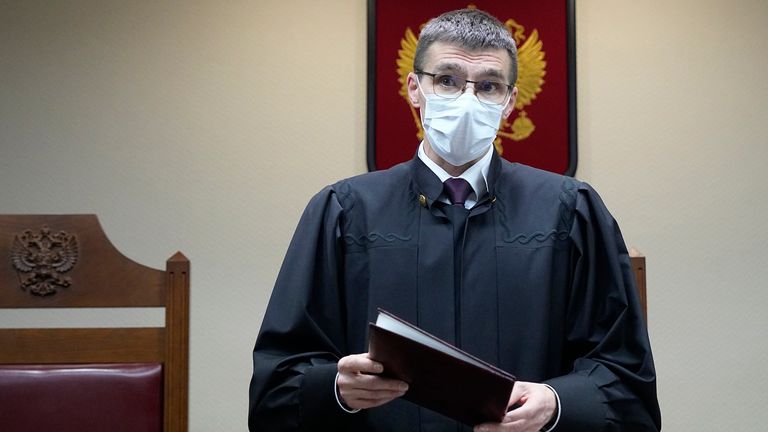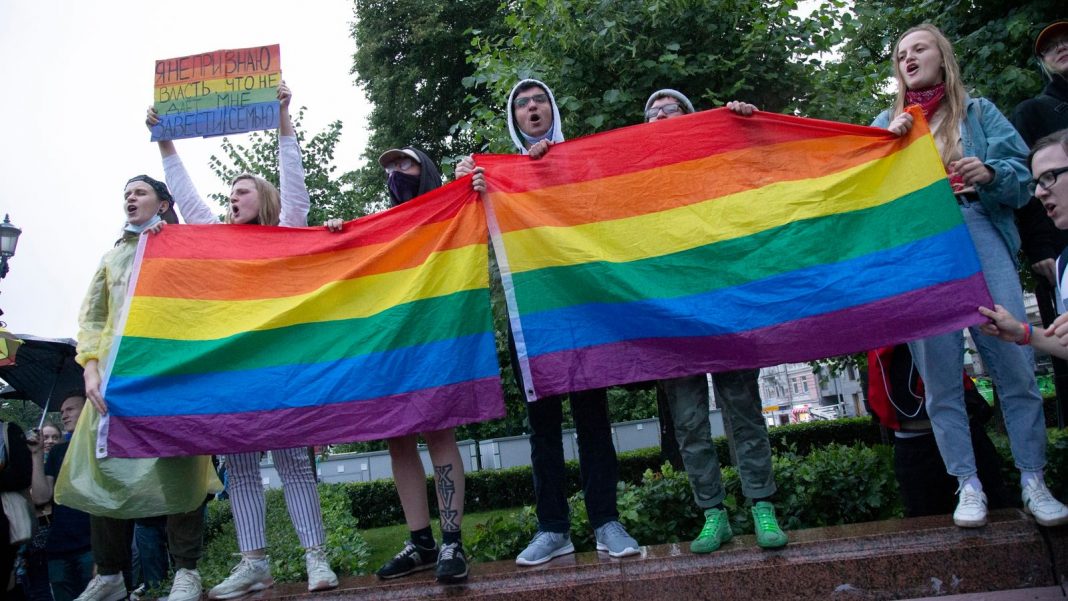A Russian court has banned LGBTQ groups from operating across the country and said gay activists should be classed as extremists.
The Supreme Court in Moscow declared LGBTQ activists should be banned from taking part in campaigning in Russia, sparking fears gay people will be rounded up and thrown in jail.
The landmark ruling today effectively outlawed LGBTQ activism, in another step Russian authorities have taken in recent years against gay, lesbian and transgender rights.
The legal request was made by the justice ministry earlier this month, in a move to shut down those pushing for increased rights for the community.
In the filing, it was claimed “signs and manifestations of an extremist nature” by an LGBTQ “social movement” had been discovered operating in Russia, including “incitement of social and religious discord”.
However, no evidence of this was submitted to the court as part of the government department’s case.
Activists near the Russian Supreme Court after the hearing in Moscow. Pic: AP
The Supreme Court took just over two hours to issue its ruling, after opening its session at 10am local time (7am UK time).
The proceedings took place behind closed doors and no media were inside the court during the deliberations, but reporters were allowed in to hear the decision.
It is the latest move in a pattern of increasing restrictions in Russia on expressions of sexual orientation and gender identity, including laws outlawing the promotion of “non-traditional” sexuality and banning legal or medical changes of gender.
In 2013, the Kremlin adopted the first legislation restricting LGBTQ rights, known as the “gay propaganda” law, banning any public endorsement of “non-traditional sexual relations” among children.
Read more:
Putin tells Elton John he is ‘mistaken’ over Russian LGBT rights
Alexei Navalny jailed for a further 19 years over ‘extremism’
Kremlin says Putin is fine amid more reports of illness
Then in 2020, constitutional reforms pushed through by President Putin to extend his rule by two more terms, also included a provision to outlaw same-sex marriage.
After sending troops into Ukraine in 2022, the Kremlin ramped up its comments about protecting “traditional values” from what it called the West’s “degrading” influence.

Russian Supreme Court judge Oleg Nefedov. Pic: AP
Vladimir Putin, expected shortly to announce that he will seek a new six-year term as leader in March, has long sought to promote an image of Russia as a guardian of traditional moral values – in contrast with a ‘decadent West’.
In a speech last year, he said the West was welcome to adopt “rather strange, in my view, new-fangled trends like dozens of genders and gay parades” but had no right to impose them on other countries.
Putin’s spokesman Dmitry Peskov told reporters before the court decision was announced that the Kremlin was “not following” the case and had no comment on it.
Alexei Sergeyev, an LGBT activist in St Petersburg, said in an interview earlier this month after the filing was made on 17 November: “Of course it’s very alarming, and I don’t remember the threat ever being so serious and real.”
More than 100 groups are already banned in Russia as “extremist”, including the Jehovah’s Witnesses religious movement and organisations linked to opposition politician Alexei Navalny – all leading to arrests of activists.
Sergeyev said activities such as psychological and legal support, or even “meetings where you can just sit and drink tea”, would be driven underground, depriving many LGBTQ people of support.
He added: “They will either commit suicide or simply be in some terrible state – their life will be shortened and their health will deteriorate, they will drink and smoke more, and so on, somehow trying to escape from this reality.”







